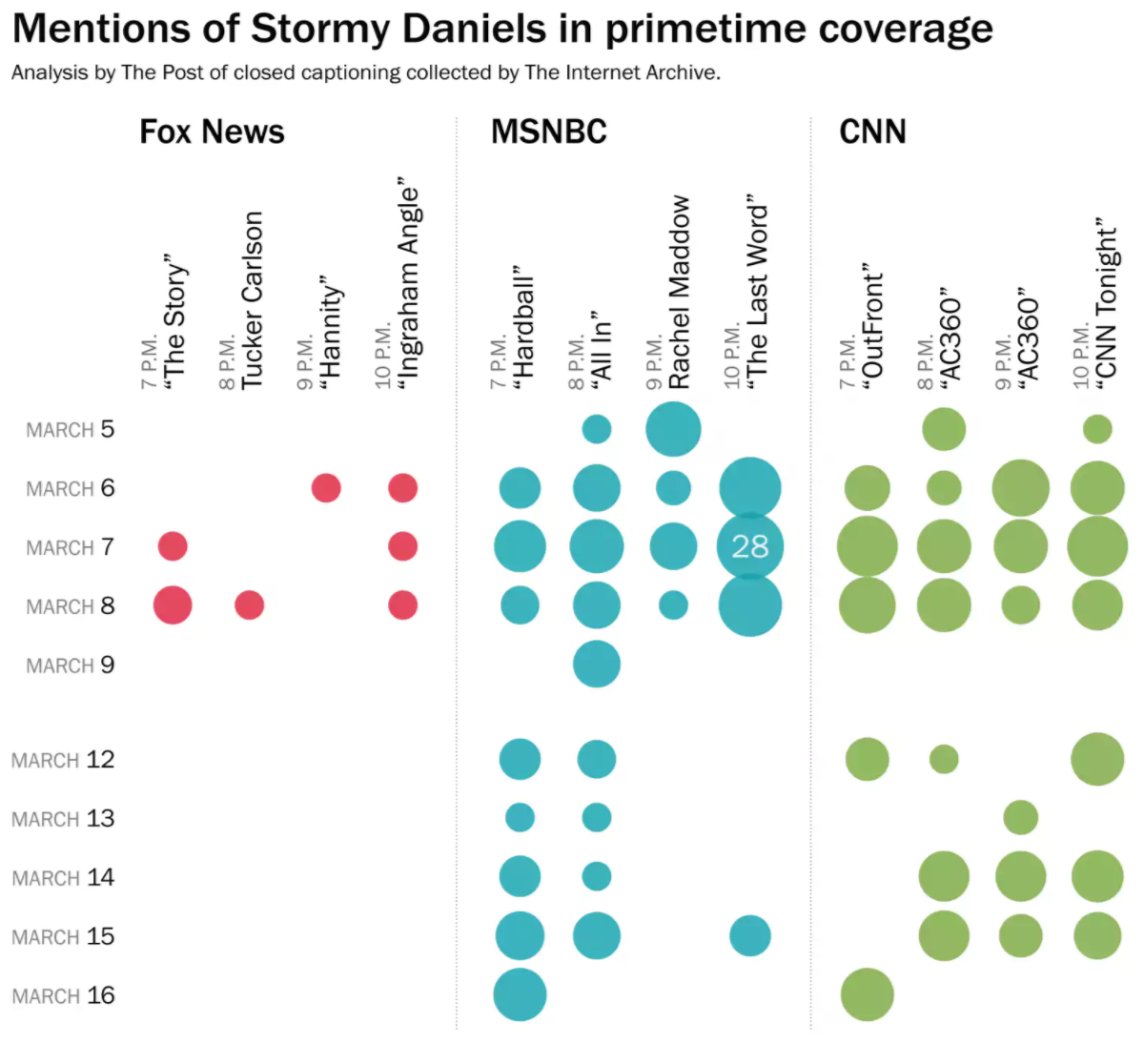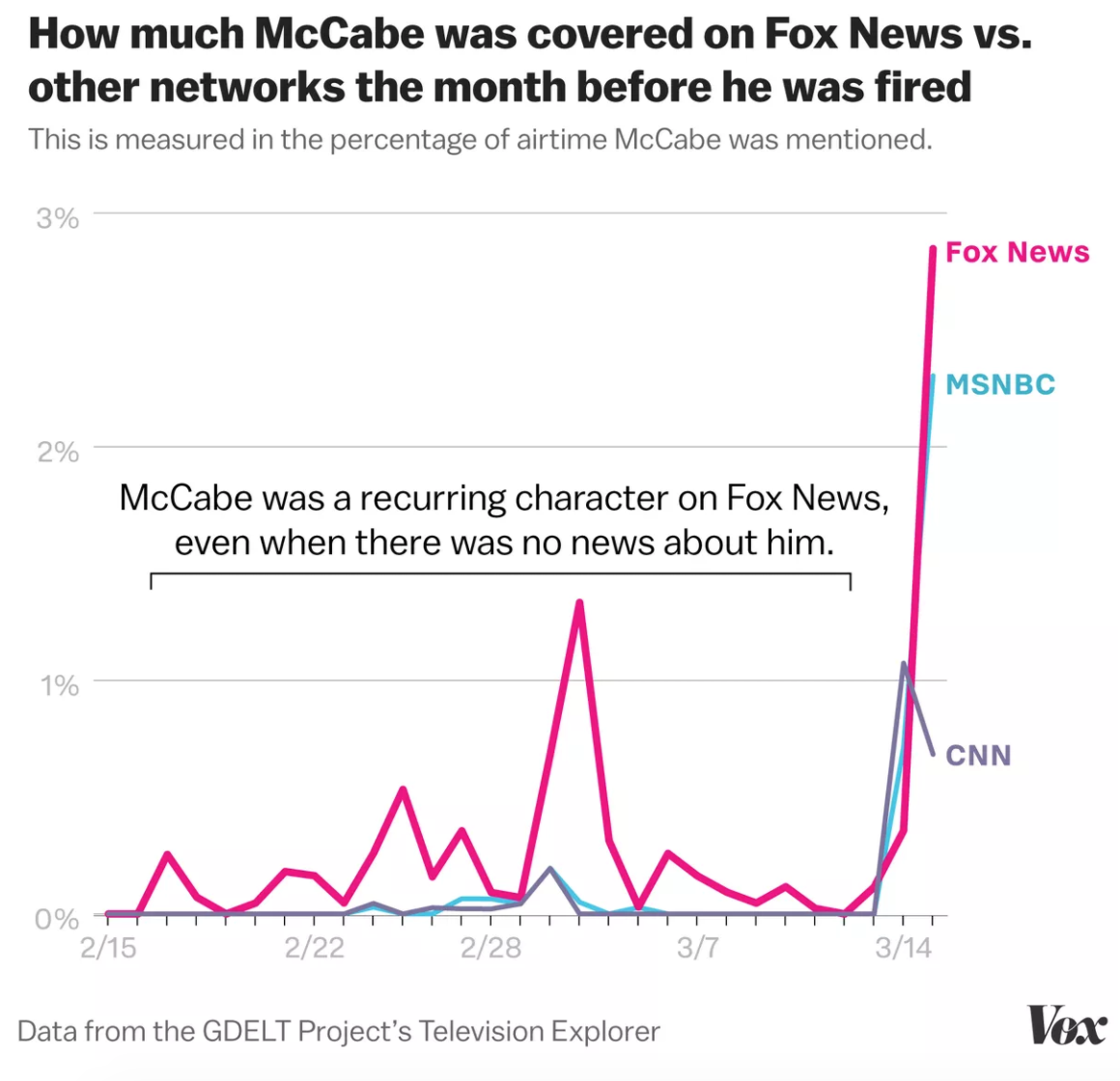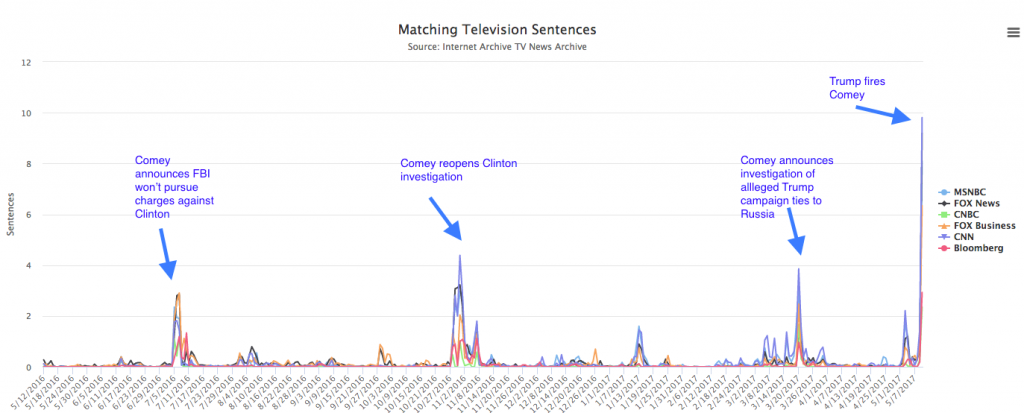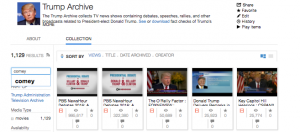A round up on what’s happening at the TV News Archive by Katie Dahl and Nancy Watzman.
This week, we present a Washington Post analysis of coverage of an alleged affair by the president; a Vox piece examining coverage of Andrew McCabe, the former deputy FBI director; and The Toronto Star’s use of a salient clip to illustrate a point about a presidential appointment. We also show fact-checks from FactCheck.org, PolitiFact, and The Washington Post’s Fact-Checker on claims related to banking, public lands, and trade policy.
Chicken-egg question on cable news coverage of alleged affair
CNN and MSNBC hosts and guests are talking a lot more about the alleged past affair between President Donald Trump and Stormy Daniels than Fox News is, according to Philip Bump’s latest analysis for The Washington Post using TV News Archive data via Television Explorer.
Bump used the analysis as context to dig into a poll released by Suffolk University earlier this month: “One-fifth of Americans said that Fox News was the news or commentary source they trusted the most, a group that was primarily made up of Republicans… There’s a chicken-egg question here. Does Fox give the Stormy Daniels story a light touch because its audience is largely supportive of Trump or is Fox’s audience largely supportive of Trump because of the coverage they see on Fox? Or is it both?”
Did Fox News reporting contribute to perception of fired FBI official?
Vox’s Alvin Chang argues a connection between the firing of Andrew McCabe, former FBI deputy director, to a narrative built up over the course of months by Fox News. Using TV News Archive data via Television Explorer, Chang reports that “long before he was fired, Fox News… constantly referred to McCabe as the quintessential example of the FBI’s corruption and anti-Trump bias. They hinted that he was plotting several schemes against Trump during the election, leaking information to the press, and was bought and paid for by Hillary Clinton and Democrats.” This, he writes, allowed FOX News viewers to think it made “perfect sense for Attorney General Jeff Sessions (perhaps directed by Trump) to fire McCabe.” Chang goes on to warn, “This alternate reality is being fed into the president’s mind.”
What new presidential economic pick had to say about Canadian PM
The Toronto Star embedded a TV news clip in a piece on Trump’s pick to replace his economic advisor. Larry Kudlow, who is taking over from Gary Cohn as economic advisor, had said of U.S. trade policy: “NAFTA is the key. And unfortunately we’re going after a major NAFTA ally, and perhaps America’s greatest ally, namely Canada. Even with this left-wing crazy guy Trudeau, they’re still our pals. They’re still our pals. Why are we going after them?” The clip has been viewed more than 112,000 times and counting.
Fact-Check: Senate banking bill a big win for Wall Street (Yes and No)
In a floor speech, Sen. Elizabeth Warren, D., Mass., said of the latest proposal to make changes to Dodd-Frank, “This bill is about goosing the bottom line and executive bonuses at the banks that make up the top one half of 1 percent of banks in this country by size. The very tippy-top.”
Manuela Tobias reported for PolitiFact: “The bill raises the bar of what is considered a big bank five-fold, which effectively relaxes the standards for large regional banks. Experts warn this also could open a door for bigger Wall Street bank giveaways.
The bill also has a few provisions affecting banks above $250 billion in assets. However, the effects would largely depend on the Federal Reserve’s interpretation of the law. The biggest banks might be able to get relaxed regulations, but then again, they might not.”
Fact-Check: Public lands proposal largest in history (False)
In a Senate hearing on the budget for the Dept. of the Interior, Interior Secretary Ryan Zinke said the president’s proposal “is the largest investment in our public lands infrastructure in our nation’s history. Let me repeat that, this is the largest investment in our public lands infrastructure in the history of this country.”
PolitiFact rates the claim false. Louis Jacobson reported: “It’s far from assured that the maximum figure of $18 billion in the proposal will ever be reached if enacted. Beyond that, though, Roosevelt’s $3 billion investment in the Civilian Conservation Corps would amount to $53 billion today, and it accounted for vastly more than the Trump proposal as a percentage of federal spending at the time.”
Fact-Check: U.S. has trade deficit with Canada (Four Pinocchios)
After a private meeting with Canadian Prime Minister Justin Trudeau, Trump defended his view about U.S.-Canada trade, tweeting, “We do have a Trade Deficit with Canada, as we do with almost all countries (some of them massive). P.M. Justin Trudeau of Canada, a very good guy, doesn’t like saying that Canada has a Surplus vs. the U.S.(negotiating), but they do … they almost all do … and that’s how I know!”
Glenn Kessler reports for The Washington Post’s Fact Checker that the president is not including services in his analysis of the trade relationship with Canada. He adds: “The president frequently suggests the United States is losing money with these deficits, but countries do not ‘lose’ money on trade deficits. A trade deficit simply means that people in one country are buying more goods from another country than people in the second country are buying from the first.” Kessler gives the claim four Pinocchios.
Eugene Kiely reports for FactCheck.org that the president’s claim that figures giving the U.S. a trade surplus with Canada are not including timber and energy is “not accurate. The Census Bureau, which is within the U.S. Department of Commerce, said its trade figures do include timber and energy and referred us to two publications that show that the agency does include timber and energy for imports and exports.”
Follow us @tvnewsarchive, and subscribe to our biweekly newsletter here.



